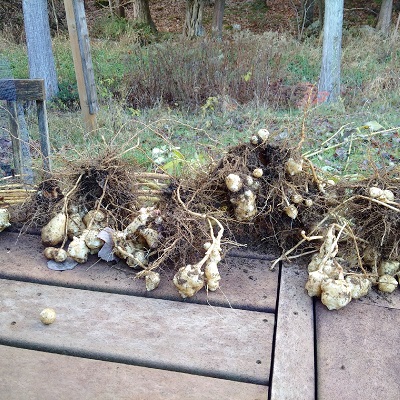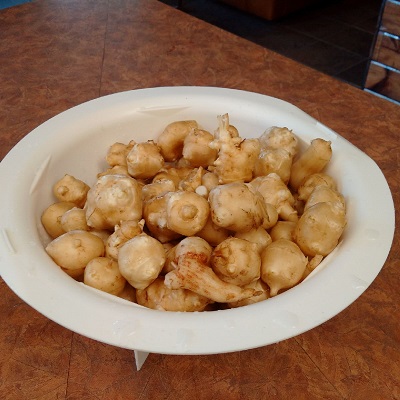Submitted by Marj Andre, a member of the Richmond Hill Garden & Horticultural Society
Last spring my husband excitedly told me that our cottage neighbour, an eighty-year-old Korean man, gave him some pig potatoes to plant. Hmmm. I had never heard of pig potatoes. I googled “pig potatoes” and I couldn’t find anything. It took a lot of coaxing for me to plant these things for several reasons. I didn’t have a lot of room in my cottage garden. The garden needs to be fenced to keep the deer out. And I don’t eat potatoes.
But in late May I planted them. They started to grow. Nineteen of them! And they grew and grew. I had to tie them to the deck railing. They didn’t look like potatoes. A friend visited the cottage with his father, an older Chinese man, who loved to garden. He was excited to see them. He knew what they were. But there was not a good English translation. Something like ‘chokes’!!??
I thought I recognized the plant. Sunflowers? My google search this time came up with Jerusalem Artichokes, which are a type of sunflower! Helianthus tuberosus.
So, how did it get called a Jerusalem artichoke? Well, the Italian gardeners who first settle here called it a sunflower or girasole. If you slur your speech, “Girasole” ended up sounding like “Jerusalem”. The artichoke part of its name comes from the taste!
In the first week of November, I harvested them.

I was pleased that they washed up well and would not require peeling.

They are to be stored in a cool dry place. So, what am I to do with this harvest! Back to Google. I have added it to soups. And I will try roasting some.
I left a few in the ground for next year. My Korean neighbour has warned me that they will spread and that I may want to put a below-ground barrier between them and the rest of the garden.
This plant has an interesting history. It had been taken to Europe and cultivated there. It gradually fell into obscurity in North America. It is regarded as a nuisance for cash crops. Indigenous chefs have been including them in their cuisine, referring to them as sunchokes. They are also called sunroot, wild sunflower, topinambur, or earth apple.
So why would my cottage neighbour refer to them as pig potatoes? These tubers do not contain starch, as do the typical potato. Starch cannot easily be digested by pigs. These tubers contain inulin (not insulin) and hence can be eaten by pigs! Thus – potato-like food for pigs!
Oh, if you eat a lot of them the inulin may cause gas, hence another nickname – “fartachokes”. If you see these anywhere to buy, you may you want to plant them now. Just don’t eat a lot at one time.
Other interesting articles on Jerusalem Artichokes:
- Growing Jerusalem Artichokes (Sunchokes) by Helen Gazeley
- Before You Plant Sunchokes, You Need to Read This Post By Laurie Neverman









